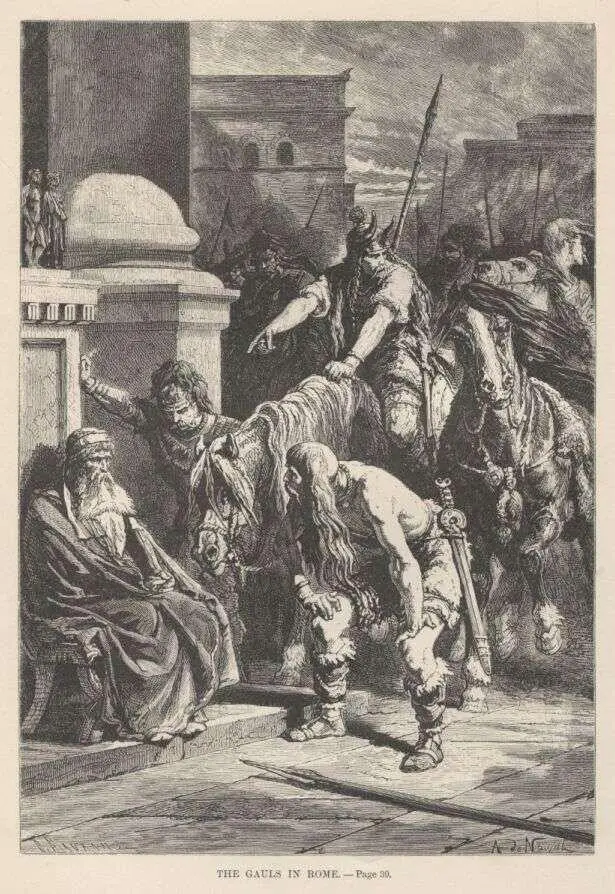
The Roman historians have done no more than justice in extolling the saviors of Rome. But their memory would have suffered no loss had the whole truth been made known; and the claims of national vanity are not of the same weight as the duty one owes to truth. Now, it is certain that Camillus did not gain such decisive advantages over the Gauls as the Roman accounts would lead one to believe, and that the deliverance of Rome was much less complete. On the 13th of February, 389 B.C., the Gauls, it is true, allowed their retreat to be purchased by the Romans; and they experienced, as they retired, certain checks, whereby they lost a part of their booty. But twenty-three years afterwards they are found in Latium scouring in every direction the outlying country of Rome, without the Romans daring to go out and fight them. It was only at the end of five years, in the year 361 B.C., that, the very city being menaced anew, the legions marched out to meet the enemy. “Surprised at this audacity,” says Polybius, “the Gauls fell back, but merely a few leagues from Rome, to the environs of Tibur; and thence, for the space of twelve years, they attacked the Roman territory, renewing the campaign every year, often reaching the very gates of the city, and being repulsed indeed, but never farther than Tibur and its slopes.” Rome, however, made great efforts, every war with the Gauls was previously proclaimed a tumult, which involved a levy in mass of the citizens, without any exemption, even for old men and priests. A treasure, specially dedicated to Gallic wars, was laid by in the Capitol, and religious denunciations of the most awful kind hung over the head of whoever should dare to touch it, no matter what the exigency might be. To this epoch belonged those marvels of daring recorded in Roman tradition, those acts of heroism tinged with fable, which are met with amongst so many peoples, either in their earliest age, or in their days of great peril. In the year 361 B.C., Titus Manlius, son of him who had saved the Capitol from the night attack of the Gauls, and twelve years later M. Valerius, a young military tribune, were, it will be remembered, the two Roman heroes who vanquished in single combat the two Gallic giants who insolently defied Rome. The gratitude towards them was general and of long duration, for two centuries afterwards (in the year 167 B.C.) the head of the Gaul with his tongue out still appeared at Rome, above the shop of a money-changer, on a circular sign-board, called “the Kymrian shield” (scutum Cimbricum). After seventeen years’ stay in Latium, the Gauls at last withdrew, and returned to their adopted country in those lovely valleys of the Po which already bore the name of Cisalpine Gaul. They began to get disgusted with a wandering life. Their population multiplied; their towns spread; their fields were better cultivated; their manners became less barbarous. For fifty years there was scarcely any trace of hostility or even contact between them and the Romans. But at the beginning of the third century before our era, the coalition of the Samnites and Etruscans against Rome was near its climax; they eagerly pressed the Gauls to join, and the latter assented easily. Then commenced the second period of struggles between the two peoples. Rome had taken breath, and had grown much more rapidly than her rivals. Instead of shutting herself up, as heretofore, within her walls, she forthwith raised three armies, took the offensive against the coalitionists, and carried the war into their territory. The Etruscans rushed to the defence of their hearths. The two consuls, Fabius and Decius, immediately attacked the Samnites and Gauls at the foot of the Apennines, close to Sentinum (now Sentina). The battle was just beginning, when a hind, pursued by a wolf from the mountains, passed in flight between the two armies, and threw herself upon the side of the Gauls, who slew her; the wolf turned towards the Romans, who let him go. “Comrades,” cried a soldier, “flight and death are on the side where you see stretched on the ground the hind of Diana; the wolf belongs to Mars; he is unwounded, and reminds us of our father and founder; we shall conquer even as he.” Nevertheless the battle went badly for the Romans; several legions were in flight, and Decius strove vainly to rally them. The memory of his father came across his mind. There was a belief amongst the Romans that if in the midst of an unsuccessful engagement the general devoted himself to the infernal gods, “panic and flight” passed forthwith to the enemies’ ranks. “Why daily?” said Decius to the grand pontiff, whom he had ordered to follow him and keep at his side in the flight; “ ’tis given to our race to die to avert public disasters.” He halted, placed a javelin beneath his feet, and covering his head with a fold of his robe, and supporting his chin on his right hand, repeated after the pontiff this sacred form of words:—
“Janus, Jupiter, our father Mars, Quirinus, Bellona, Lares, … ye gods in whose power are we, we and our enemies, gods Manes, ye I adore; ye I pray, ye I adjure to give strength and victory to the Roman people, the children of Quirinus, and to send confusion, panic, and death amongst the enemies of the Roman people, the children of Quirinus. And, in these words for the republic of the children of Quirinus, for the army, for the legions, and for the allies of the Roman people, I devote to the gods Manes and to the grave the legions and the allies of the enemy and myself.”
Then remounting, Decius charged into the middle of the Gauls, where he soon fell pierced with wounds; but the Romans recovered courage and gained the day; for heroism and piety have power over the hearts of men, so that at the moment of admiration they become capable of imitation.
During this second period Rome was more than once in danger. In the year 283 B.C. the Gauls destroyed one of her armies near Aretium (Arezzo), and advanced to the Roman frontier, saying, “We are bound for Rome; the Gauls know how to take it.” Seventy-two years afterwards the Cisalpine Gauls swore they would not put off their baldricks till they had mounted the Capitol, and they arrived within three days’ march of Rome. At every appearance of this formidable enemy the alarm at Rome was great. The senate raised all its forces and summoned its allies. The people demanded a consultation of the Sibylline books, sacred volumes sold, it was said, to Tarquinius Priscus by the sibyl Amalthea, and containing the secret of the destinies of the Republic. They were actually opened in the year 228 B.C., and it was with terror found that the Gauls would twice take possession of the soil of Rome. On the advice of the priests, there was dug within the city, in the middle of the cattle-market, a huge pit, in which two Gauls, a man and a woman, were entombed alive; for thus they took possession of the soil of Rome, the oracle was fulfilled, and the mishap averted. Thirteen years afterwards, on occasion of the disaster at Cann, the same atrocity was again committed, at the same place and for the same cause. And by a strange contrast, there was at the committing of this barbarous act, “which was against Roman usage,” says Livy, a secret feeling of horror, for, to appease the manes of the victims, a sacrifice was instituted, which was celebrated every year at the pit, in the month of November.
In spite of sometimes urgent peril, in spite of popular alarms, Rome, during the course of this period, from 299 to 258 B.C., maintained an increasing ascendency over the Gauls. She always cleared them off her territory, several times ravaged theirs, on the two banks of the Po—called respectively Transpadan and Cispadan Gaul, and gained the majority of the great battles she had to fight. Finally in the year 283 B.C., the proprietor Drusus, after having ravaged the country of the Senonic Gauls, carried off the very ingots and jewels, it was said, which had been given to their ancestors as the price of their retreat. Solemn proclamation was made that the ransom of the Capitol had returned within its walls; and, sixty years afterwards, the Consul M. Cl. Marcellus, having defeated at Clastidium a numerous army of Gauls, and with his own hand slain their general, Virdumar, had the honor of dedicating to the temple of Jupiter the third “grand spoils” taken since the foundation of Rome, and of ascending the Capitol, himself conveying the armor of Virdumar, for he had got hewn an oaken trunk, round which he had arranged the helmet, tunic, and breastplate of the barbarian king.
Читать дальше













